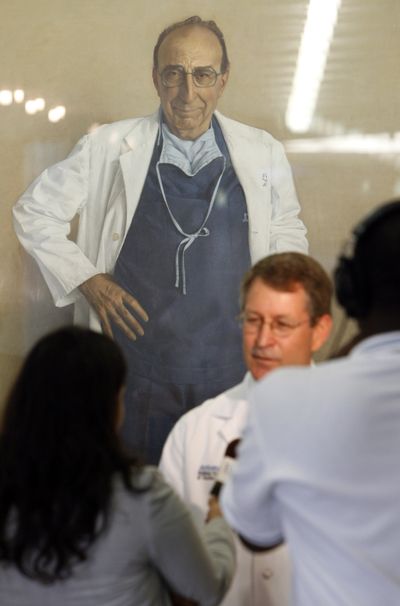Heart surgery pioneer dies
DeBakey developed bypass procedure

HOUSTON – When Dr. Michael E. DeBakey pushed forward with his groundbreaking research and maverick approach to medicine a half century ago, heart surgery was a medical marvel.
Today, in part because of his contributions, it routinely saves thousands of lives each day.
DeBakey, a world-famous cardiovascular surgeon who pioneered bypass surgery and invented a host of devices to help heart patients, died Friday night in Houston. He was 99.
According to a statement issued early Saturday by Baylor College of Medicine and Methodist Hospital, DeBakey died of “natural causes” shortly after arriving at the hospital. The hospital’s heart and vascular center bears his name.
DeBakey, whose career spanned more than 70 years, counted world leaders among his patients and helped turn Baylor from a provincial school into one of the nation’s great medical institutions.
“Dr. DeBakey’s reputation brought many people into this institution, and he treated them all: heads of state, entertainers, businessmen and presidents, as well as people with no titles and no means,” said Ron Girotto, president of The Methodist Hospital System.
A tireless worker and stern taskmaster, DeBakey performed more than 60,000 heart surgeries and had scores of patients under his care at any one time.
Among his patients were presidents Kennedy, Johnson and Nixon, former Russian President Boris Yeltsin, the Shah of Iran, King Hussein of Jordan, Turkish President Turgut Ozal and Nicaraguan leader Violetta Chamorro.
But he said celebrities didn’t get special treatment: “Once you incise the skin, you find that they are all very similar.”
At an April ceremony in Washington in which DeBakey was awarded the Congressional Gold Medal, Congress’ highest civilian honor, President Bush said the award placed the surgeon in the company of inventor Thomas Edison, Army doctor Walter Reed and Jonas Salk, who developed the polio vaccine.
“His legacy is holding the fragile and sacred gift of human life in his hands and returning it unbroken,” Bush said at the time.
Born to Lebanese immigrants on Sept. 7, 1908, in Lake Charles, La., DeBakey said his interest in medicine began while listening to physicians chat at his father’s pharmacy.
DeBakey was the first to perform replacement of arterial aneurysms and obstructive lesions in the mid-1950s. He later developed bypass pumps and connections to replace excised segments of diseased arteries.
In early 2006, at age 97, DeBakey underwent surgery for a damaged aorta – a procedure he developed.
“There is no question that he was one of the pioneers of cardiovascular surgery in the last half of the 20th century,” Dr. Denton Cooley, president and surgeon-in-chief at the Texas Heart Institute in Houston and a longtime DeBakey rival, said Saturday.
Cooley said one of DeBakey’s greatest legacies is “he influenced so many students to pursue careers in cardiovascular surgery.”